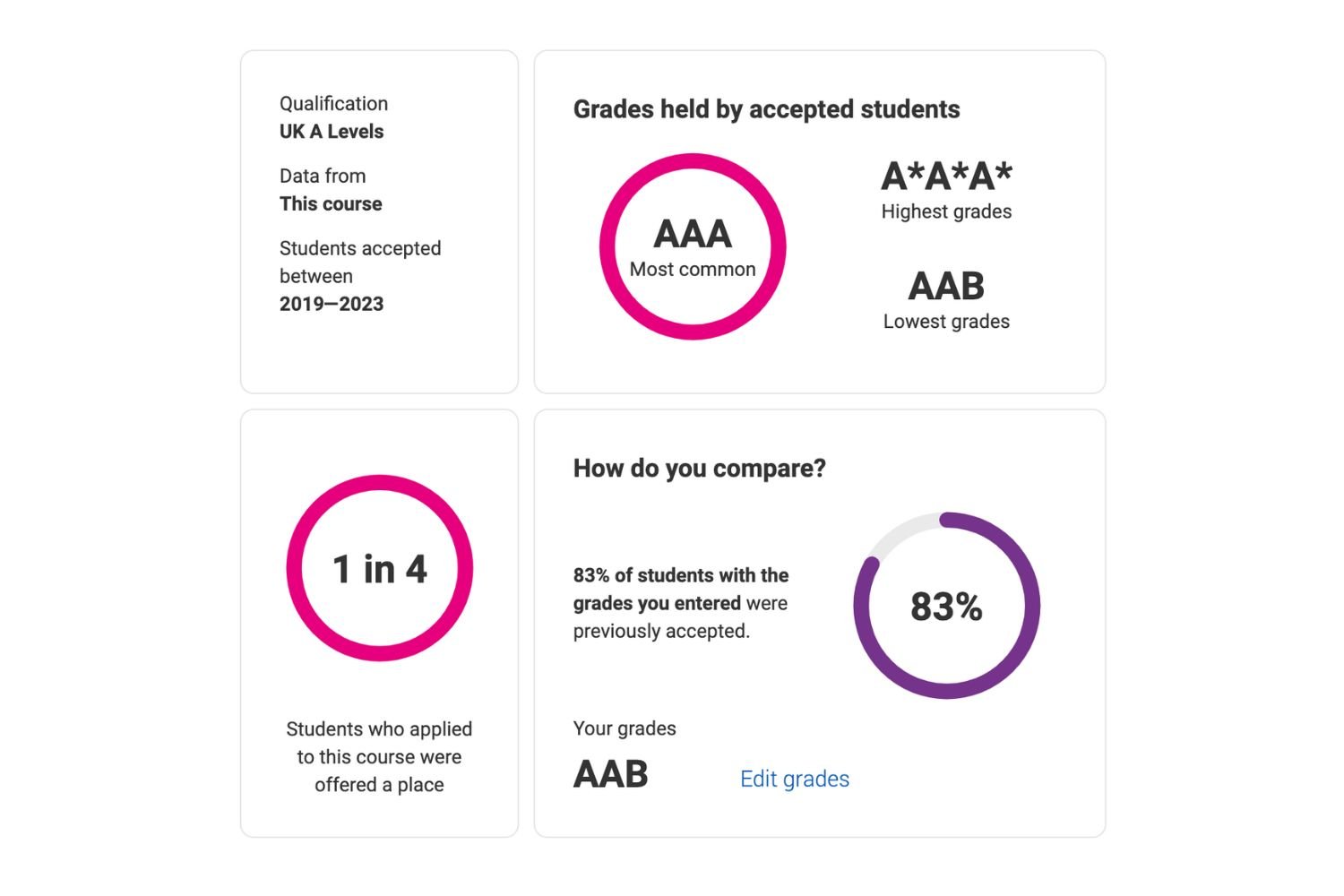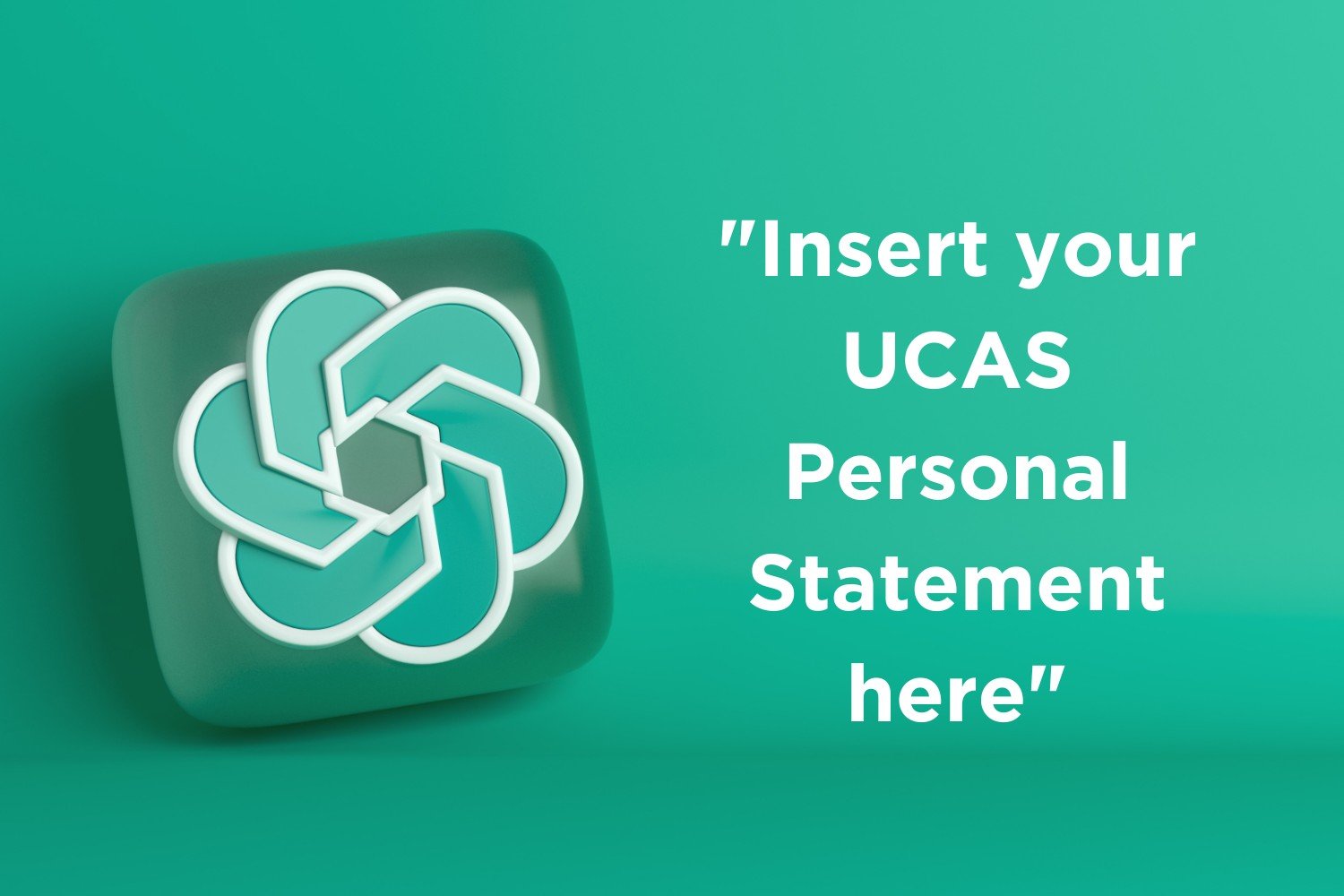Articles
Something new (nearly) every week!
Search all articles

Is it OK to apply for two different subjects through UCAS?
It's that time of year when loads of students are finalising their UCAS choices, and a question consistently asked of advisers is “Can I apply for two different subjects?”
Well, as with most things about applying to university, the answer is “it depends…”
But what exactly does it depend on?

New UCAS historical entry grades data: Just how useful is it?
For the very first time UCAS have introduced information on their website that attempts to show you what grades students actually had when they entered different courses, rather than just showing the university’s published entry grades.
It turns out, you see, that nearly 50% of students get into their course with qualifications below the level of those universities published by the universities.
So when a course says you need AAB to get in, it turns out, you don’t!
This new data is aimed at making this all a bit clearer and more transparent, so that you can make better decisions about which courses to apply to.

UCAS Extra and Clearing: A failsafe for the unexpected
Sometimes, the UCAS system might seem a bit clunky and a bit restrictive, and for many students it seems a bit complicated. But in the main, it seems to work for most people, with some 384,000 students ending up at their firm or insurance choices last year.
Yet each year, there are a whole bunch of students who the main process doesn’t quite work properly for. That’s where UCAS Extra and Clearing come in; to provide you with a failsafe for when the unexpected happens.
You might not plan on using either of these, but trust me, it's well worth spending the next five minutes reading all about them, so that you have that failsafe ready, should you need it!

Five to two: Making your final UCAS choices
As I write, many of you will be receiving offers from your chosen universities. It’s a nervous time, and while some of you will be getting offers promptly within days of applying, others may need to wait weeks, or even months for a decision.
So when you get all these decisions from universities, what happens next? Well, the response is now up to you.
The universities will all be hoping you’ll choose them. They’ll be sending you emails, inviting you to visit days, perhaps even sending you a brochure or two in the post. But the reality is that the power now rests with you. You get to choose which offers to accept!
So, how does it all work, and what should you be thinking about as you accept your offers?

Making your university choices: are you a driver or a passenger?
Right now, I’m reading Who gets in and why: A year inside college admissions, by Jeffrey Selingo. It’s a book all about university and college admissions in the US, by a renowned journalist who embedded himself inside several university admissions offices to find out what really happens. It’s a fascinating read, and while there are enormous differences between UK and US admissions, there are one or two areas where there are direct parallels between the two countries.
One aspect of his analysis that immediately resonated with me was his characterisation of applicants as either drivers or passengers.

A growth mindset; and it’s nothing to do with just being smart.
I’ve recently been reading Mindset, by Dr Carol S Dweck.
The book is a full and frank discussion of two different types of mindset: a fixed mindset, and a growth mindset, and the consequences of being stuck with the former.
A person with a fixed mindset believes they are either dumb or smart; they can’t change it.
A person with a growth mindset believes that being dumb or smart isn’t the issue. They can learn, improve, and get better, whatever their starting point is.

Three tips to help you study smarter (not harder).
The Christmas holidays might be just around the corner (yay!), but for many of you this will mean that mock A-levels (or other exams) will follow pretty shortly after that (boo!).
And so, lots of you will have teachers and parents telling you that now is the time to work harder; now is the time to revise and make sure you know your stuff.
The conscientious amongst you will do exactly this, and will spend lots of time re-reading all your notes. The less conscientious won't, but will probably pretend to be working while actually doing something completely different.
But what if there were ways that you could use your study time more effectively and more efficiently?

UCAS Applicant Days: What are they and how do you get the most out of them?
As I write this, thousands of you who have applied to UCAS relatively early will be beginning to receive offers from universities. Most of these offers will be accompanied by an invitation to go and visit the university, normally to an event called a UCAS Applicant Day, or something similar.
In this article we’ll be having a look at what these events are, how they differ from University Open Days, and what you should be looking out for if you decide to attend one.

Just how ambitious should you be with your initial five UCAS choices?
The basic principle behind the UCAS system is that it balances the need for students to have a range of choices when they apply, with the need for universities to have some kind of predictability in working out how many offers to make. So, for many years, students have been able to make up to five choices. Any more, and the universities will simply be swamped with applications that are not realistic or necessary. Any less and you could run the risk of not getting an offer of a place that suits you.
The system works reasonably well most of the time, provided students are realistic with their applications, and provided universities are transparent with their entry criteria, and consistent with their offers. This year nearly 79% of A-level students secured their firm choice (ie. their first choice course), while 12% got into their insurance choice.
So, how do you make sure the system works well for you? How do you turn all that research, all those possible choices, into a list of five courses on your application form that gives you the best chance of getting into a course that you really want to do? Is it as simple as listing your five favourite courses? I’m afraid not. But neither is it some dark art where you need to have some amazing insight and specialist knowledge to get it right. Just read on, and I’ll try to make it as simple as possible.

Having a last minute change of heart? How to change your course after results day
A-level results come out on Thursday, and alongside the results, UCAS Clearing will get into full swing. Clearing, as you’ll doubtless be aware, is the process by which applicants without a university place can quickly secure a place on one of the many courses still available.
You might be surprised, however, to know that Clearing is not just for those who didn’t make their grades. Last year around 20,000 students made the decision to go into Clearing themselves, declining their firm choice place and finding a new course. Not because they had to, but because they wanted to. If this is you, read on to find out how to do this, and some of the risks and pitfalls you might want to consider.

Personal Statements: Not ‘I have to…’ but I ‘get to…’
Every so often I come across an idea so simple and so brilliant, that it changes the way I look at almost everything. For me, this is one of those ideas. And for you, I hope it helps you take your first brave steps in writing your UCAS Personal Statement.

Writing your UCAS Personal Statement using ChatGPT
I’m writing this during a week when hundreds, if not thousands, of schools world-wide will be holding university application weeks for their year 12 students. Right at the centre of these events will be kick-off sessions for writing your UCAS Personal Statements. I wonder how many of these sessions will focus around how to make best use of ChatGPT, and how many will just conveniently ignore it?

Top 20 Personal Statement tips Part 2: Countdown from #10 to #1
As part of the launch for my new guide “How to write your UCAS Personal Statement” I’ve been counting down my top 20 tips over on Instagram.
In Part 2 of this article, we check out tips ten to one, and examine them in just a little bit more detail.

Top 20 Personal Statement tips: Countdown from #20 to #11
As part of the launch for my new guide “How to write your UCAS Personal Statement” guide. I’ve been counting down my top 20 tips over on Instagram.
In this article, I look at them in just a tiny bit more detail.
